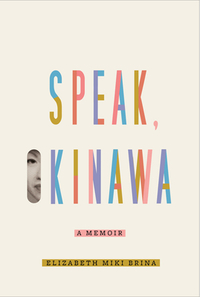Take a photo of a barcode or cover
challenging
emotional
informative
inspiring
reflective
medium-paced
challenging
emotional
hopeful
reflective
tense
medium-paced
SPEAK, OKINAWA by Elizabeth Miki Brina is a powerful memoir that braids together the history of Okinawa with Brina’s personal coming to terms with her heritage. The daughter of an Okinawan war bride and a U.S. soldier, Brina grew up in upstate NY being ashamed of her mother’s “broken” English while identifying strongly with her white father. As she learns more about Okinawan history and the power dynamics that are inherent in her parents’ relationship, she attempts in her own way to reconcile with her mother and embrace her cultural and ethnic identity.
Okinawa has a unique history - its land and people fought over and claimed by both the Chinese and Japanese, its inhabitants the victims of wars they did not choose, its territory appropriated by the U.S. government for military bases. The way Brina tells this history using first person plural injects it with an immediate emotional intimacy that is skillfully done.
In this sub-genre of memoirs by Asian American women confronting their cultural and racial inheritance as well as their relationships with their mothers, SPEAK, OKINAWA is my favorite. It is evident that Brina has thought deeply about and worked through her internalized racism, her parents’ marriage dynamics, and how historical forces continue to affect Okinawans today. She writes with a heartfelt but unflinching combination of vulnerability, maturity, and clarity. I loved how, as specific a tale as Brina spins, it carries reverberations for how all Americans might more deeply examine our nation’s imperialism and racism.
I enjoyed and would recommend the audiobook version of this memoir, narrated movingly by Sachi Lovatt.
Okinawa has a unique history - its land and people fought over and claimed by both the Chinese and Japanese, its inhabitants the victims of wars they did not choose, its territory appropriated by the U.S. government for military bases. The way Brina tells this history using first person plural injects it with an immediate emotional intimacy that is skillfully done.
In this sub-genre of memoirs by Asian American women confronting their cultural and racial inheritance as well as their relationships with their mothers, SPEAK, OKINAWA is my favorite. It is evident that Brina has thought deeply about and worked through her internalized racism, her parents’ marriage dynamics, and how historical forces continue to affect Okinawans today. She writes with a heartfelt but unflinching combination of vulnerability, maturity, and clarity. I loved how, as specific a tale as Brina spins, it carries reverberations for how all Americans might more deeply examine our nation’s imperialism and racism.
I enjoyed and would recommend the audiobook version of this memoir, narrated movingly by Sachi Lovatt.
4.5; I learned so much about the Okinawans and found so many parts of this book interesting. As much as I didn’t care for Elizabeth as a child, I do love that she came around in the end and appreciated her mother.
One of the best books I’ve read in awhile. The author does a brilliant job communicating her complicated, nuanced relationship with both of her parents and her mother’s homeland, Okinawa. Embarrassingly I never knew the role of America in occupying their land (still!) and this book brings to life the challenges that still exist today because of it. Definitely an intense story, but I highly highly recommend.
A beautiful memoir that celebrates all that Elizabeth Miki Brina is. It is vulnerable, honest and full of grace for herself and her parents. She goes into depth not only in her lived experiences, but the the experiences that have made her including the history of Okinawa and its people and their relationship with the US. A really great read.
I found this book in a list of newly published Asian American Literature. Speak, Okinawa is the memoir of Brina, daughter of an American father and an Okinawan mother (they met and married when the father was stationed in Okinawa in the 70s, and subsequently moved back to the US together).
The power unbalance in her household (mother being submissive and spoke poor English, father being dominant and well, "very American") strongly influenced Brina's racial/cultural identity and sense of self-worth. She was always trying to fit in but was rejected. I feel for her pain and struggles during her childhood and adolescence.
However, I'm not a fan of the writing style - mix stories of her own, her parents, her mother's family, and Okinawa, jump through time back and forth - it was pretty incoherent. I also had a problem with her telling Okinawa's war history from a first-person narrative, using we/us/our to tell the horrors and tragedies. I feel this was to enlist the readers' sympathy, but it was not her story to tell. I'm very glad that she educated the readers about Okinawa's history, just not in this way.
I was quite empathetic with Brina's story until she went into a series of self-destructive behaviors well into her mid-20s and 30s; the amount of self-loathing and shame she had was astonishing. You can't blame all your life problems on being mixed-race. Now she seems to have reconciled with her mother and has more understanding for her parents' relationship, I hope she also has started to accept herself fully and finds peace and happiness.
The power unbalance in her household (mother being submissive and spoke poor English, father being dominant and well, "very American") strongly influenced Brina's racial/cultural identity and sense of self-worth. She was always trying to fit in but was rejected. I feel for her pain and struggles during her childhood and adolescence.
However, I'm not a fan of the writing style - mix stories of her own, her parents, her mother's family, and Okinawa, jump through time back and forth - it was pretty incoherent. I also had a problem with her telling Okinawa's war history from a first-person narrative, using we/us/our to tell the horrors and tragedies. I feel this was to enlist the readers' sympathy, but it was not her story to tell. I'm very glad that she educated the readers about Okinawa's history, just not in this way.
I was quite empathetic with Brina's story until she went into a series of self-destructive behaviors well into her mid-20s and 30s; the amount of self-loathing and shame she had was astonishing. You can't blame all your life problems on being mixed-race. Now she seems to have reconciled with her mother and has more understanding for her parents' relationship, I hope she also has started to accept herself fully and finds peace and happiness.
Idk
I mean it's their memoir so I guess I can't really judge but also?? I wonder if this even added anything to the conversation. Are these not the same tropes we keep hearing about?
I mean it's their memoir so I guess I can't really judge but also?? I wonder if this even added anything to the conversation. Are these not the same tropes we keep hearing about?
My friend Sachi recommended this book ages ago, and I thought it was so interesting and unique. The book alternates between the author's growing up as a biracial kid and a history of Okinawa from a collective, second person plural voice. It made me want to seek out more books to learn more about Okinawa.







